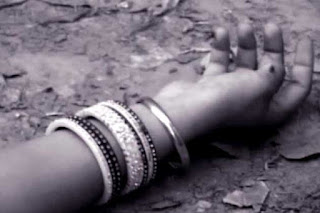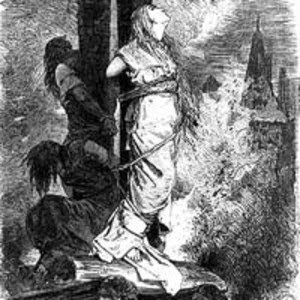Love song of Hidimbi,
the forest-dwelling wife of Bhima
I saw him by
the Parijat tree
fragrant and
wild eyed,
As he walked
to and fro
by the
sleeping shades of five.
Asked to
lure the humans,
the delectable
meat.
my cannibal
brother,
relished
with great appetite.
But one look
at him
on the Asvin poornima night,
I was heady
with love
in the bower
of milky light.
Forgetting
my sororal bonds,
the stranger
I approached.
My gait coy,
eyes downcast
this feeling
hitherto, totally unknown.
Gazing at my
swarthy face,
his dark
eyes gleamed.
he eyed me
head to toe
appreciatively,
or so, it seemed.
True to my
tribal blood,
I couldn’t
hold myself back.
And,
declared by unabashed love,
to the amusement
of brothers now awake.
He blushed
like a girl,
this mighty
son of God
and went to
stand by his mother,
who to her
son’s rescue, came to the fore.
With a regal
bearing, this fair woman
asked me my
name.
To what
lineage I belonged?
And, what
was my claim to fame.
I was
irritated by her scrutiny,
her gaze mocking
my Non-Aryan blood.
I could see
her cold condescending eyes
But his
gentle smile warmed me up.
“ I am the
princess of this vana,
Hidimbi my name.
Sister to
the mighty king Hidimb,
whose bravery
will put most men to shame.
We ride
tigers, tame elephants
And hunt
humans for meat.
But, will
forgo my cannibalistic ways
O, mother! If
your customs so insist.”
Before Kunti could open her mouth,
I saw Bheema quickly move.
He fought
with my mighty sibling,
my loyalties
torn asunder.
Betraying my
flesh and blood,
I prayed for
the man I had just met.
And, as my
brother laid dying
A single
tear was shed.
“Was this
the brother thou boasted about
Who had sent
thee?
Look, I have
killed him with my bare hands.”
How Bheema taunted me.
But, Kunti intervened this time
The most
unexpected ally,
She chided
her beloved son
and hugged
me tightly.
“O daughter,
thanks for warning us,
Thou may
return to thy tribe.
My son, here
will escort thee back,
to thine
home’s safety”.
I looked at
him entreatingly
as he walked
with me.
Silent now
but with a tender gaze,
his face
changed totally.
No more the
fierceness of battle,
no more that
sardonic gleam,
He clasped
my hand in his large ones,
and confessed
his love for me.
By the
river, in the grotto
we bowed our
heads in my family shrine.
Outside, in
dawn’s honeyed light,
He vowed to
be forever mine.
My modest
hut with Asoka scarlet flowers,
gave us the
conjugal bliss.
We heard
the cooing of doves,
my fragrant
body entwined with his.
My beloved
told me of their travails,
about their Lakshagraha flight,
running from
their scheming kin,
denied their
legitimate right.
Kunti came searching for him
with her
other mighty sons.
Arjuna with his Gandiva ready
to rescue
his dada from the cannibals.
We welcomed
them with folded hands,
my lord and
I.
As the queen
of this verdant forest,
gave asylum to
the mother of five.
Thus, the kshatriyas settled with us,
with royal
sophistications at bay.
But, atleast
they were safe here,
my mother-in-law
mulled each day.
A year of
unadulterated joy was this,
the
foresters loved their guests
and then
little Ghatotkacha arrived
to everyone’s
sheer delight.
He had big
almond eyes,
on the full
moon face.
The stoic
grandma also beamed,
singing lullaby
with great tenderness.
Wearing, the
tribal feathers,
the ten
month old moon-faced baby
was fed with
the first morsel,
as per the
tradition of his dad’s family.
Why, then Bheema looked so sad
As he came
to me that night,
His favourite
Mahua untouched
he just held
me tight.
The following
day, they were to leave,
the mother
and the brothers five.
And clearly
the tribal mother-son duo
didn’t
belong to Hastinapur’s high life.
I wasn’t the
kshatriya queen
who would be
so admired.
My dusky
looks and curly mops
would jeopardize
all that was desired.
The five
were a unit,
like a
closed fist.
And, like a
self effacing wife,
I must not
resist.
Wails of Ghatotkacha, my silent sobs
and the
wetness of Bheema’s red eyes.
None could
move the steely determination,
and minute
by minute all hope dies.
And, then
they left us,
on the cold amavasya night.
As my
husband gave us one last glance
in the earthen
lamp’s flickering light.
- Neha Bansal
(Painting by: Neha Bansal and Dhruw Singh)













